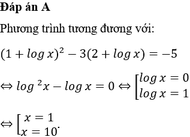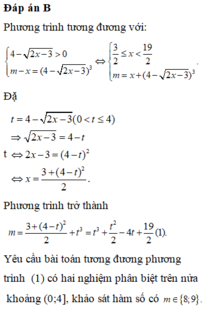Đặt t=log3(x) thì bất pt log^25(5x)-3log√5(x)-5<0 trở thành.....log mũ 2 5 của 5x ạ
BL
Những câu hỏi liên quan
Tổng các nghiệm của phương trình
(
l
o
g
(
10
x
)
)
2
-
3
l
o
g
(
100
x
)
-
5
bằng A. 11. B.
11
10
. C. 110. D.
101
10
.
Đọc tiếp
Tổng các nghiệm của phương trình ( l o g ( 10 x ) ) 2 - 3 l o g ( 100 x ) = - 5 bằng
A. 11.
B. 11 10 .
C. 110.
D. 101 10 .
log3sqrt{3}... , log100... , lne3... , log27 3... , logsqrt{3}3... , log0,125 2... , logsqrt[3]{49}7...,logdfrac{1}{125}5... , log8 4... , log25dfrac{1}{5}... , logdfrac{1}{5}sqrt{5}... , logdfrac{1}{7}sqrt[5]{49}... , log4 dfrac{1}{sqrt{2}}... , log27 3sqrt{3}...
Đọc tiếp
log3\(\sqrt{3}\)=... , log100=... , lne3=... , log27 3=... , log\(\sqrt{3}\)3=... , log0,125 2=... , log\(\sqrt[3]{49}\)7=...,
log\(\dfrac{1}{125}\)5=... , log8 4=... , log25\(\dfrac{1}{5}\)=... , log\(\dfrac{1}{5}\)\(\sqrt{5}\)=... , log\(\dfrac{1}{7}\)\(\sqrt[5]{49}\)=... , log4 \(\dfrac{1}{\sqrt{2}}\)=... , log27 \(3\sqrt{3}\)=...
\(log_3\sqrt{3}=log_33^{\dfrac{1}{2}}=\dfrac{1}{2}\)
\(lne^3=log_ee^3=3\)
\(log_{27}3=log_{3^3}3=\dfrac{1}{3}\)
\(\log_{\sqrt{3}}3=log_{3^{\dfrac{1}{2}}}3=1:\dfrac{1}{2}=2\)
\(\log_{0,125}2=log_{2^{-3}}2=\dfrac{1}{-3}\)
\(\log_{\sqrt[3]{49}}7=\log_{7^{\dfrac{2}{3}}}7=1:\dfrac{2}{3}=\dfrac{3}{2}\)
\(\log_{\dfrac{1}{125}}5=\log_{5^{-3}}5=-\dfrac{1}{3}\)
\(\log_84=log_{2^3}2^2=\dfrac{1}{3}\cdot2=\dfrac{2}{3}\)
\(\log_{25}\left(\dfrac{1}{5}\right)=\log_{5^2}5^{-1}=\dfrac{1}{2}\cdot\left(-1\right)=-\dfrac{1}{2}\)
\(\log_{\dfrac{1}{5}}\sqrt{5}=\log_{5^{-1}}5^{\dfrac{1}{2}}=\dfrac{1}{-1}\cdot\dfrac{1}{2}=-\dfrac{1}{2}\)
\(log_{\dfrac{1}{7}}\sqrt[5]{49}=\log_{7^{-1}}7^{\dfrac{2}{5}}=\dfrac{1}{-1}\cdot\dfrac{2}{5}=-\dfrac{2}{5}\)
\(\log_4\left(\dfrac{1}{\sqrt{2}}\right)=\log_{2^2}\left(\sqrt{2}\right)^{-1}\)
\(=\log_{2^{-2}}\left(\sqrt{2}\right)^{-\dfrac{1}{2}}=\dfrac{1}{-2}\cdot\dfrac{-1}{2}=\dfrac{1}{4}\)
\(\log_{27}3\sqrt{3}=\log_{3^3}3^{\dfrac{3}{2}}=\dfrac{1}{3}\cdot\dfrac{3}{2}=\dfrac{1}{2}\)
Đúng 1
Bình luận (0)
Có tất cả bao nhiêu số nguyên m để phương trình
log
(
m
-
x
)
3
log
(
4
-
2
x
-
3
)
có hai nghiệm thực phân biệt A. 6 B. 2 C. 3 D. 5
Đọc tiếp
Có tất cả bao nhiêu số nguyên m để phương trình log ( m - x ) = 3 log ( 4 - 2 x - 3 ) có hai nghiệm thực phân biệt
A. 6
B. 2
C. 3
D. 5
Giải các phương trình lôgarit sau:
a) \(log^{\left(2^x+1\right)}_2.log^{\left(2^{x+1}+2\right)}_2=2\); b) \(x^{log9}+9^{logx}=6\)
c) \(x^{3log^3x-\dfrac{2}{3}logx}=100\sqrt[3]{10}\) d) \(1+2log_{x+2}5=log^{\left(x+2\right)}_5\)
a)
Có:
\(log_2^{\left(2^x+1\right)}.log_2^{\left(2^{x+1}+2\right)}=2\)
\(\Leftrightarrow log_2^{\left(2^x+1\right)}.\left[1+log_2^{\left(2^{x+1}\right)}\right]=2\)
Đặt \(t=log_2^{\left(2^x+1\right)}\), ta có phương trình \(t\left(1+t\right)=2\Leftrightarrow t^2+t-2=0\)
\(\Leftrightarrow\left[{}\begin{matrix}t=1\\t=-2\end{matrix}\right.\Leftrightarrow\left[{}\begin{matrix}log_2^{\left(2^x+1\right)}=1\\log_2^{\left(2x+1\right)}=-2\end{matrix}\right.\)
\(\Leftrightarrow\left[{}\begin{matrix}2^x+1=2\\2^x+1=\dfrac{1}{4}\end{matrix}\right.\Leftrightarrow\left[{}\begin{matrix}2^x=1\\2^x=-\dfrac{3}{4}\left(không-t.m\right)\end{matrix}\right.\Leftrightarrow x=0\)
b)
Với điều kiện \(x>0\), ta có:
\(log.\left(x^{log9}\right)=log9.logx\) và \(log\left(9^{logx}=logx.log9\right)\)
nên \(log\left(x^{log9}\right)=log\left(9^{logx}\right)\)
\(\Rightarrow x^{log9}=9^{logx}\)
Đặt \(t=x^{log9}\), ta được phương trình \(2t=6\Leftrightarrow t=3\Leftrightarrow x^{log9}=3\)
\(\Leftrightarrow log\left(x^{log9}\right)=log3\Leftrightarrow log9.logx=log3\)
\(\Leftrightarrow logx=\dfrac{log3}{log9}\Leftrightarrow x=\dfrac{1}{2}\)
\(\Leftrightarrow x=\sqrt{10}\) (thỏa mãn điều kiện \(x>0\)).
c)
Với điều kiện \(x>0\), lấy lôgarit thập phân hai vế của phương trình đã cho, ta được:
\(\left(3log^3x-\dfrac{2}{3}logx\right).logx=\dfrac{7}{3}\)
Đặt \(t=logx\), ta được phương trình:
\(3t^4-\dfrac{2}{3}t^2-\dfrac{7}{3}=0\)
\(\Leftrightarrow9t^4-2t^2-7=0\Leftrightarrow\left[{}\begin{matrix}t^2=1\\t^2=-\dfrac{7}{9}\left(không-t.m\right)\end{matrix}\right.\Leftrightarrow\left[{}\begin{matrix}t=1\\t=-1\end{matrix}\right.\)
\(\Leftrightarrow\left[{}\begin{matrix}logx=1\\logx=-1\end{matrix}\right.\Leftrightarrow\left[{}\begin{matrix}x=10\\x=\dfrac{1}{10}\end{matrix}\right.\)
d)
Đặt \(t=log_5^{\left(x+2\right)}\) với điều kiện \(x+2>0\), \(x+2\ne1\), ta có:
\(1+\dfrac{2}{t}=t\Leftrightarrow t^2-t-2=0,t\ne0\)
\(\Leftrightarrow\left[{}\begin{matrix}t=-1\\t=2\end{matrix}\right.\Leftrightarrow\left[{}\begin{matrix}log_5^{\left(x+2\right)}=-1\\log_5^{\left(x+2\right)}=2\end{matrix}\right.\Leftrightarrow\left[{}\begin{matrix}x+2=\dfrac{1}{5}\\x+2=25\end{matrix}\right.\Leftrightarrow\left[{}\begin{matrix}x=-\dfrac{9}{5}\\x=23\end{matrix}\right.\)
Đúng 0
Bình luận (0)
Giải pt: x+25/2x^2-50 - x+5/x^2-5x = 5-x/2x^2+10x
ĐKXĐ: \(x\notin\left\{0;5;-5\right\}\)
Ta có: \(\frac{x+25}{2x^2-50}-\frac{x+5}{x^2-5x}=\frac{5-x}{2x^2+10x}\)
\(\Leftrightarrow\frac{x\left(x+25\right)}{2x\left(x+5\right)\left(x-5\right)}-\frac{2\left(x+5\right)^2}{2x\left(x-5\right)\left(x+5\right)}+\frac{\left(x-5\right)^2}{2x\left(x+5\right)\left(x-5\right)}=0\)
Suy ra: \(x^2+25x-2\left(x^2+10x+25\right)+x^2-10x+25=0\)
\(\Leftrightarrow2x^2+15x+25-2x^2-20x-50=0\)
\(\Leftrightarrow-5x-25=0\)
\(\Leftrightarrow-5x=25\)
hay x=-5(loại)
Vậy: \(S=\varnothing\)
Đúng 1
Bình luận (0)
Đề bài
Giải mỗi phương trình sau:
a) \({\left( {0,3} \right)^{x - 3}} = 1\)
b) \({5^{3x - 2}} = 25\)
c) \({9^{x - 2}} = {243^{x + 1}}\)
d) \({\log _{\frac{1}{x}}}(x + 1) = - 3\)
e) \({\log _5}(3x - 5) = {\log _5}(2x + 1)\)
f) \({\log _{\frac{1}{7}}}(x + 9) = {\log _{\frac{1}{7}}}(2x - 1)\)
\(a,\left(0,3\right)^{x-3}=1\\ \Leftrightarrow x-3=0\\ \Leftrightarrow x=3\\ b,5^{3x-2}=25\\ \Leftrightarrow3x-2=2\\ \Leftrightarrow3x=4\\ \Leftrightarrow x=\dfrac{4}{3}\\ c,9^{x-2}=243^{x+1}\\ \Leftrightarrow3^{2x-4}=3^{5x+5}\\ \Leftrightarrow2x-4=5x+5\\ \Leftrightarrow3x=-9\\ \Leftrightarrow x=-3\)
Đúng 0
Bình luận (0)
d, Điều kiện: \(x>-1;x\ne0\)
\(log_{\dfrac{1}{x}}\left(x+1\right)=-3\\ \Leftrightarrow x+1=x^3\\ x\simeq1,325\left(tm\right)\)
e, Điều kiện: \(x>\dfrac{5}{3}\)
\(log_5\left(3x-5\right)=log_5\left(2x+1\right)\\ \Leftrightarrow3x-5=2x+1\\ \Leftrightarrow x=6\left(tm\right)\)
f, Điều kiện: \(x>\dfrac{1}{2}\)
\(log_{\dfrac{1}{7}}\left(x+9\right)=log_{\dfrac{1}{7}}\left(2x-1\right)\\ \Leftrightarrow x+9=2x-1\\ \Leftrightarrow x=10\left(tm\right)\)
Đúng 0
Bình luận (0)
giải bất pt bậc nhất một ẩn
a)2x+7>0
b)-5x+12<+17
c)-3x+5>-5x+2
d)\(\dfrac{x}{2}+3< 7\)
Lời giải:
a. $2x+7>0$
$\Leftrightarrow x> \frac{-7}{2}$
b.
$-5x+12<17$
$\Leftrightarrow -5x< 5$
$\Leftrightarrow 5+5x>0$
$\Leftrightarrow 5x>-5$
$\Leftrightarrow x>-1$
c.
$-3x+5>-5x+2$
$\Leftrightarrow (-3x+5)-(-5x+2)>0$
$\Leftrightarrow 2x+3>0$
$\Leftrightarrow x> \frac{-3}{2}$
d.
$\frac{x}{2}+3< 7$
$\Leftrightarrow \frac{x}{2}< 4$
$\Leftrightarrow x< 8$
Đúng 2
Bình luận (0)
giải bất pt:
\(\frac{1}{2}\)log2x - log5x > 1
ĐK;x>0
<=> \(\frac{1}{2}\)log2x-log2x-log52>1
<=>\(\frac{1}{2}\)log2x>1+log52
<=> log2x>\(\frac{1+log_{ }^{ }}{2}\)( ví a=2>0)
<=>x>2\(\frac{1+log_{ }^{ }}{2}\)
Đúng 0
Bình luận (0)
Luyện tập – Vận dụng 8
Giải mỗi bất phương trình sau:
a) \({\log _3}x < 2\)
b) \({\log _{\frac{1}{4}}}\left( {x - 5} \right) \ge - 2\)
a, Điều kiện: x > 0
\(log_3\left(x\right)< 2\\ \Rightarrow0< x< 9\)
b, Điều kiện: x > 5
\(log_{\dfrac{1}{4}}\left(x-5\right)\ge-2\\ \Rightarrow x-5\le16\\ \Leftrightarrow5< x\le21\)
Đúng 0
Bình luận (0)





